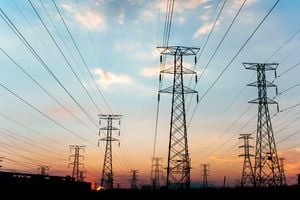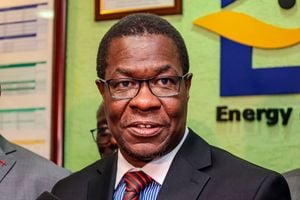
Energy Cabinet Secretary Opiyo Wandayi is pushing for the removal of the parliamentary ban on new Power Purchase Agreements.
The State is pushing for the lifting of a ban by Parliament on the signing of new Power Purchase Agreements (PPAs) to help unlock new electricity generation plants amid thinning reserves.
Energy and Petroleum Cabinet Secretary Opiyo Wandayi said the move will enable the government to contract private firms to build power generation plants to increase the country’s generation capacity even as demand grows.
“We are pursuing the lifting of the moratorium so that we can resume signing new PPAs,” said Mr Wandayi. The CS said on Friday on the sidelines of a tree planting exercise at Eldama Ravine in Baringo County.
“We have no timeline on this but we remain optimistic. We hope that in a month or so we will have been able to resolve this matter,” said the CS.
The Cabinet in February last year lifted a moratorium that had been imposed by former President Uhuru Kenyatta’s government.
The moratorium was however immediately reinstated by Parliament following a petition by Laikipia Member of Parliament (MP) Jane Kagiri.
In her petition for reforms to lower the cost of electricity, Ms Kagiri sought State intervention to regulate all independent power producers (IPPs) in the country as well as publicising their locations, stakeholders, directors, management, and their addresses.
This led to an inquiry by Parliament into the operations of Kenya Power that delved deep into the utility’s agreements with IPPs, over-reliance on IPPs against available renewable and other energy sources and possible measures to be taken to reduce the cost of electricity.
Mr Kenyatta cancelled the PPAs over concerns over their high costs and long duration. Many of the PPAs involved renewable energy projects and therefore the government was keen on cheaper tariffs owing to the rapidly falling costs of renewable energy technologies.
There was also concern over the dollar-denomination of the long-term contracts in foreign currency. The government wanted all new projects to be signed in Kenyan shillings to protect consumers from forex losses.
Parliament’s moratorium on PPAs has however slowed down the process of contracting new power generation plants amid thinning power reserves.
The country is under renewed pressure to raise its power production amid last week’s revelations by Mr Wandayi that the country experienced load-shedding in August on low power reserves.
“During the last peak demand of 2239MW (Mega Watt) recorded on August 21, 2024, 6MW was load shed from the grid while the reserve margin was only 9MW against the system requirement of 310MW,” the CS said in a statement.
The power rationing in August has brought focus to the shelved projects, which had a total generation capacity of 2,345.07 MW.
The 92 power projects cancelled by Mr Kenyatta’s government were in the early stages of development. Some 44 of the cancelled projects were to generate power from solar with a total capacity of 1,093.1 megawatts(MW) while 35 projects with a total capacity of 900.72MW targeted generation from hydro.
Meanwhile, five projects sought to generate electricity from wind with a total generation capacity of 202.5MW, while a further eight biogas projects totaling 148.75MW were also put on hold.
Mr Wandayi said once the ban on PPAs is lifted, the government would focus on contracting geothermal and hydro investments which are baseload sources.
“Our focus is increasingly on geothermal energy resources and to an extent the hydro. That does not mean that we are abandoning the solar and wind generation, but we want to be able to increase our baseload,” said the CS.
One of the plants the government is targeting to help increase generation is a 35MW geothermal plant being developed by UK firm Globeleq at Menengai in Nakuru.
The plant is expected to be completed next year.
Energy Principal Secretary Alex Wachira said on Wednesday that Kenya will add an extra 285 MW of renewable energy to its national grid by 2027, boosting the country’s fast-dwindling electricity reserves.
He said a pipeline of geothermal power projects, including the 100MW Paka in Baringo County, is expected to help the country meet its growing energy demands while promoting green energy production.
“Looking at the country’s spinning reserve and capacity, I am happy we have about 35MW coming in by 2025 from UK-based Globeleq, and for China’s Kaishan, after unlocking some challenges in the coming days, will give us some 70 MW by the same period or in the first quarter of 2026,” the official said on the sidelines of a geothermal development symposium in Nakuru on Wednesday.
“We also want to bring on board the first 80 MW from Olkaria 7 around the first quarter of 2027 and that should come on board when Paka will also be connected,” Mr Wachira added.







